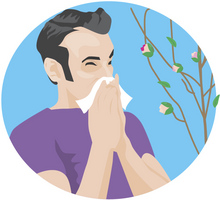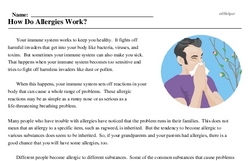How Do Allergies Work?
Your immune system works to keep you healthy. It fights off harmful invaders that get into your body like bacteria, viruses, and toxins. But sometimes your immune system can also make you sick. That happens when your immune system becomes too sensitive and tries to fight off harmless invaders like dust or pollen.
When this happens, your immune system sets off reactions in your body that can cause a whole range of problems. These allergic reactions may be as simple as a runny nose or as serious as a life-threatening breathing problem.
Many people who have trouble with allergies have noticed that the problem runs in their families. This does not mean that an allergy to a specific item, such as ragweed, is inherited. But the tendency to become allergic to various substances does seem to be inherited. So, if your grandparents and your parents had allergies, there is a good chance that you will have some allergies, too.
Different people become allergic to different substances. Some of the common substances that cause problems for many people include pollen, dust, certain chemicals, animal dander, mold, insect venoms, and certain foods. Your body can be exposed to these substances by breathing them in, by swallowing them, or by getting them on your skin. Substances that cause allergic reactions are called allergens.
Some people are allergic mainly to seasonal allergens, such as pollen from trees or grass. Others are allergic to everyday substances that are around at all times, such as dust or pet dander. Still other people are allergic to specific foods, such as peanuts, milk, or seafood.




